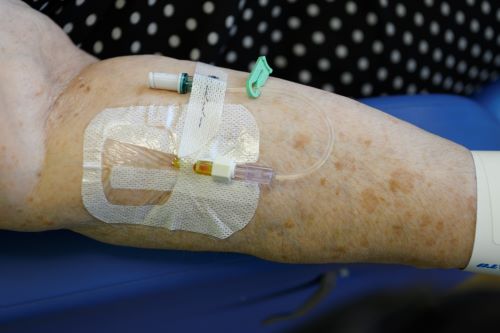Chemotherapy through a small tube (cannula)
You might have chemotherapy through a small tube (called a cannula) into a vein. You usually have a cannula into one of the large veins in your arm or sometimes into your hand. They can stay in for a few days if needed,
You can have chemotherapy drugs through a cannula in different ways:
- as an injection into your bloodstream
- through a drip
If you have breast cancer, you might have surgery to remove lymph nodes from under your arm. Your doctor or nurse will try not to put a cannula in your arm on the side you had surgery. They should also not put a cannula in a vein in your arm if you have  in it.
in it.

Possible problems with cannulas
Your healthcare team can use your cannula to give you medicines and fluids as well as your chemotherapy. After treatment, your cannula is removed and the area can heal. Cannulas usually work well but there are possible problems:
-
drips into a cannula can be temperamental – they can stop and start when you move your arm
-
some people have very fragile veins in their arms – this can make it difficult for the doctor or nurse to get a cannula in
-
there is a potential, serious problem with cannulas where fluid can leak out into the surrounding tissues instead of going into the vein. This is called extravasation.
Fluid leaking into surrounding tissue (extravasation)
Leaking fluid might make the area around the cannula become hard, swollen or red. Sometimes it’s possible for the doctor or nurse to take the cannula out and put a new one in. And after a day or so the swollen area is usually completely recovered.
Some chemotherapy drugs can cause damage to the tissues if they leak. These drugs are called vesicants. A vesicant drug that leaks can cause pain and ulceration to the body tissues.
This might not happen straight away. The area can become more swollen and painful over the next few days. Ulcers (sore and broken areas of skin) may develop within 2 weeks.
This type of damage can take quite a long time to heal. Some people may need treatment from a plastic surgeon, although this is rare.
Your doctor and nurse know if the drug you’re having is a vesicant. They keep a close eye on the chemotherapy drug to make sure it doesn’t leak into your tissues instead of your vein.
Let them know immediately if the drip stops going. Or if the area around the cannula:
-
is getting sore
-
feels like it is burning or tingling
-
becomes red
-
starts swelling
-
looks or feels different in any way
Extravasation is a rare but possible problem. Your nurses and doctors will follow hospital policies and guidelines to prevent it happening. They’ll also have guidelines to deal with the situation if it does happen. Immediate treatment can help to stop tissue damage happening in the first place.
Depending on your situation, your doctor might recommend you have a central line instead of a cannula. A central line is a longer tube that goes into a central blood vessel in your chest.



